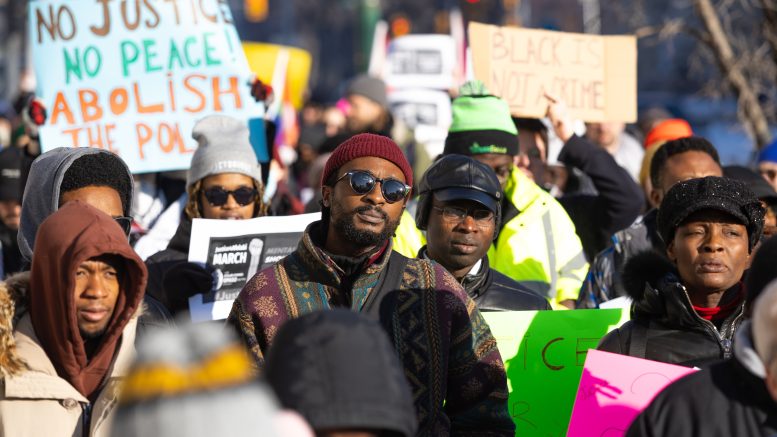The words “No justice, no peace,” echoed at Union Station Saturday afternoon as more than one hundred people gathered to protest the killing of Afolabi Stephen Opaso, a 19-year-old Nigerian international student at the U of M who was fatally shot by police on Dec. 31, 2023.
The march was organized by the U of M Nigerian students’ association, the Black students’ community (BSC) at the University of Manitoba and the Nigerian association of Manitoba, to raise awareness about Opaso’s death and the ongoing investigation into his killing.
During her speech, Titi Tijani, president of African communities of Manitoba, demanded that police avoid using “lethal force” in such situations, “so that people in our community, especially young people, can feel safe,” she said.
“We are here today, not for long speeches, but to stand in solidarity with the Opaso family, and the families of all victims of fatal police shootings in our community and our province,” said Tijani.
Among the organizers for the march, Dola Akintan, vice president student engagement for the BSC, said the march was organized to show support for Opaso and his family.
“As executives, we did not think that we would be planning a candle light [vigil], we did not think that we would be marching to the police, demanding justice,” Akintan said.
Akintan said since Afolabi’s death, students have been speaking out about how they felt.
“It’s really taken a toll on everybody, but it’s going to be a slow and gradual process for everyone to bounce right back,” she said.
Adeola Obasa, co-vice president advocacy for the BSC, said she thinks that the U of M “could have done better” at responding to the situation and given more support to the BSC as they worked to respond as well.
“They’re a team as well, and they have their hands stuck as well, just as we did,” she said.
Obasa said Opaso’s killing made her feel “helpless,” since there was not much she and the other student organizations could do.
“We’ve tried our best to just keep students in the loop,” she said, adding that the BSC executive wants students to know the group is “trying [their] best.”
She hopes that after the march, people will be aware that Black people in Canada also face disproportionate police violence, not just in the United States, and that “this is a struggle that we have to deal with.”
Although the community struggles, it is not going to keep quiet or stop bringing awareness to these issues.
“We’re human beings as well, we came here for a better life,” said Obasa.
“We came here because we felt like we have something to contribute to society and that this society would embrace us and love us as a human being as well.”
“Seeing that this has happened, I guess we were wrong.”
Obasa said she hoped students at U of M who felt unsafe knew that BSC would be there for them, “no matter what happens.”
“We’re not backing down,” she said.
“We’re not stopping anytime soon, we’re not going quiet anytime soon,” said Akintan.



